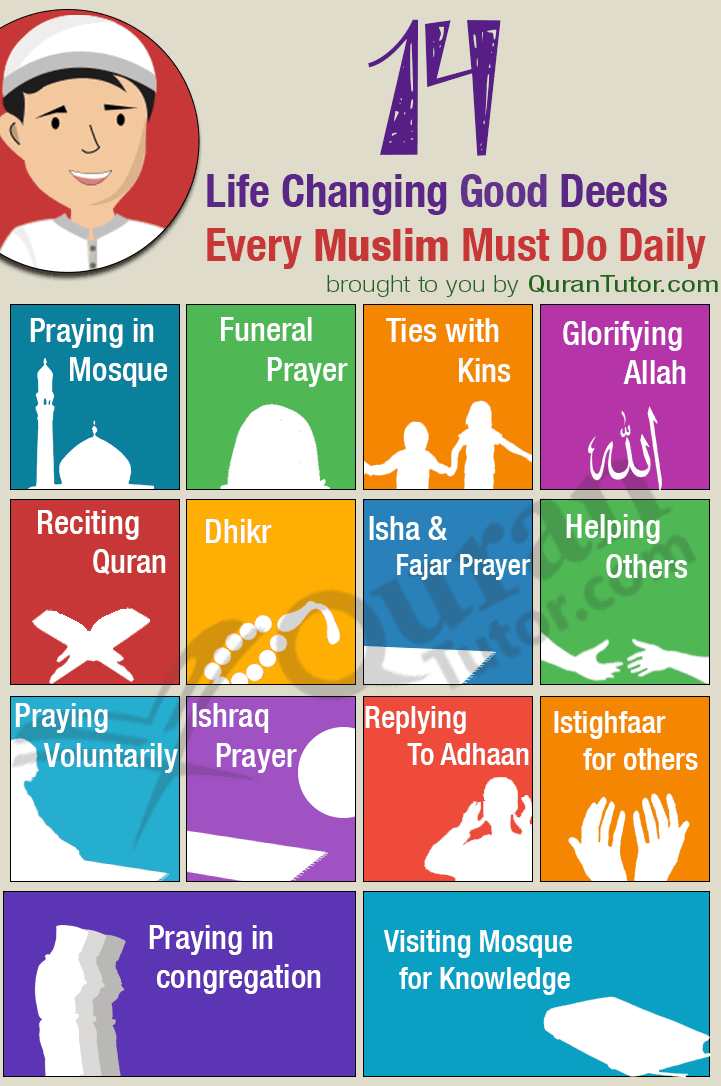14 Life Changing Good Deeds Every Muslim Must Do Daily
Islam does not encourage asceticism. Islam is a religion for the society, therefore, it expects from its followers to develop a society where every individual works towards helping and taking care of each other and where the rule of goodness prevails. All the instructions that Islam bring are with the objective that people could change their life for better and continue living it in a better manner.
Although the generic guidelines of Islam are such which are sufficient for a person to follow for making the life good, however, there are some simple things which a person can change in order to ensure a good life. The lines below give such 14 simple life changing good deeds that a Muslim must do everyday to ensure a better and happier life.
Before moving on to the good deeds, one must also consider that why should a person commit good deeds at all? The answer to this is given by Allah Almighty in the following verse of Quran:
“Whoever works righteousness – whether male or female – while he (or she) is a true believer (of Islamic monotheism) verily, to him We will give a good life (in this world with respect, contentment and lawful provision), and We shall pay them certainly a reward in proportion to the best of what they used to do. (i.e. Paradise in Hereafter).” (16:97)
From the ayah it is clear that those who believe and commit good deeds for them Allah has a better life in this world and in the life Hereafter as well. Therefore, the committing of good deeds actually stands for a person making his or her life better and it also helps Muslims to become closer to Allah. Some good deeds that a Muslim must incorporate in the daily life are as follows: (Check Info graphic & Share)

1. Praying In Mosque:
Prophet Muhammad (PBUH) said in a hadith:
“Whoever goes to the mosque in the morning and evening, Allah will prepare for him an honorable place in the Paradise every time he goes and comes.” (Bukhari)
From the hadith, the advantage or the benefit of going to mosque to offer prayer in congregation is clear. In addition to bringing the humungous reward of a better place in the hereafter, the offering of prayer in mosque also provides the chance of socializing with other Muslims and knowing about them. When Muslims meet in congregation five times a day they are definitely to grow close to each other and make the fabric of society stronger.
2. Funeral Prayer:
Prophet Muhammad (PBUH) said in one of His hadiths:
“Whoever attends a funeral until he offers the (funeral) prayer will have one qiraat (of reward) and whoever attends until the burial is done will have two qiraats.” It was asked: “What are the two qiraats?” He said: “Like two great mountains.” (Bukhari)
This hadith shows the importance and significance of offering funeral prayer in addition to attending the funeral as well. When a Muslim offers prayer he receives reward equivalent to one great mountain, but if he stays with the funeral till the burial takes place then he earns double the reward. In addition to reward, the offering of funeral and staying at the funeral serves as a kind of respect to the one deceased and as a gesture of support for the family of the deceased. Therefore, one must try to attend a funeral every day if is happening around a Muslim.
3. Holding Ties With Kins:
In one of His hadiths, Prophet Muhammad (PBUH) said:
“Whoever would like his provision to be increased and his lifespan extended, let him uphold his ties of kinship.” (Bukhari)
The hadith shows that upholding the relations with the kins is a means of increasing one’s provision. In addition to this increase in provision from Allah, the upholding of ties with kinship spreads love across the family and represents the unity that is present in a family, which then goes to the broader level of a strong and united society.
4. Glorifying Allah:
In another hadith, Prophet (PBUH) said:
“Whoever says Subhan Allah wa bi Hamdih (Praise and Glory be to Allah) one hundred times, morning and evening, his sins will be erased even if they are like the foam of the sea.” (Bukhari)
From this hadith the power of glorifying Allah Almighty in this particular way is clear. This type of glorifying keeps a person from pride and also helps resist the temptation of sin as well. Thus, when a person performs this type of glorification morning and evening, in addition to earning reward it also makes a person less tempted towards sin.
5. Quran Recitation:
It is an obvious thing that learning to read Quran and recitation of it on daily basis is the best way of earning reward in addition to knowing more about the instructions that Allah Almighty has for humans. Prophet (PBUH) said in a hadith:
“Whoever reads a letter of the Book of Allah will be credited with a good deed, and a good deed gets tenfold reward. I do not say that alif-laam-meem is a letter, rather alif is a letter, laam is a letter and meem is a letter.” (Tirmidhi)
From the hadith it is obvious that every single alphabet of Quran brings ten rewards. Therefore, in addition to developing understanding of the word of Allah a Muslim gets great reward as well on daily bases for each recitation.
6. Praying In Congregation:
Pertaining to offering prayer, Muhammad (PBUH) said in a hadith:
“Prayer in congregation is superior to praying individually twenty-seven times.” (Bukhari)
A Muslim has to pray five times a day, however, if this prayer is offered in congregation, the reward associated with each prayer increases. Therefore, instead of offering the prayer alone a Muslim must make sure that he finds some congregation with whom he could offer the prayer.
7. Isha And Fajr Prayer:
Fajr is the prayer of dawn while Isha is the prayer of night, both these prayers in other words mark the start and end of the day of a Muslim. Regarding them, Prophet Muhammad (PBUH) said in His hadith:
“He who prays Isha in Jamah (congregation) is as if he has prayed for half the night. As to him who (also) prays Fajr in congregation, it is as if he prayed all night.” (Muslim)
From this hadith it is clear that if a Muslim offers both Isha and Fajr prayer in congregation, it means that a Muslim has spent the whole night praying. Therefore, if one could get such reward for just offering both these prayers with congregation and then sleeping in between them, then one must make it a part of daily routine.
8. Voluntary Prayer:
Pertaining to voluntary prayer, Prophet Muhammad (PBUH) said:
“The most superior prayer of a person is in his home, except the obligatory prayers.” (Bukhari)
From the hadith it is clear that if one has to offer voluntary prayer for the sake of reward, then the best place of offering it is in the home. Voluntary prayers are in addition to obligatory prayer and they bring reward to the person offering it, however, if it offered in front of the people there is a chance that it can trigger the element of pride in the people. Therefore, one must offer voluntary prayer but try to offer it in the boundaries of the house.
9. Ishraq Prayer:
Ishraq is an additional prayer that is offered at the time of sunrise, pertaining to it, Prophet Muhammad (PBUH) said in a hadith:
“Whoever prayers al Fajr in congregation, then sits remembering Allah until sunrise, then prays two units of prayer, has a complete reward of Hajj and Umrah.” (Tirmidhi)
From the hadith the reward of offering Ishraq prayer is evident. However, in order to gain the reward one has to firstly offer Fajr prayer with congregation and then remain there remembering Allah and then offer the Ishraq prayer. It is surely a habit which one can adopt in the daily routine and earn such great reward.
10. Visiting Mosque For Knowledge:
Prophet Muhammad (PBUH) said in a hadith:
“Whoever goes to the mosque not desiring except to learn or teach what is good has the reward of a pilgrim who completed his Hajj.” (Tabarani)
The hadith shows the reward for going to the mosque for the purpose of learning. A Muslim must also make the habit of going to the mosque daily and learn something there, whether it is by attending some seminar or if it is as simple as consulting the books available in the mosque.
11. Replying to Adhaan:
Prophet (PBUH) said in a hadith:
“Say as they say (in Adhan), and when you finish, ask and you will be given.” (Abu Dawud)
Adhan is the call to the prayer. It is one of the most sacred calls that a Muslim gets to listen five times a day. Therefore, a Muslim must utilize this chance and reply to the call by repeating after the caller and earn whatever he or she wishes against this action.
12. Istighfaar For Others:
Prophet Muhammad (PBUH) said in another of His renowned hadiths:
“Whoever seeks forgiveness for believing men and believing women, Allah will write for him a good deed for each believing man and woman.” (Tabarani)
Everyone of us seeks forgiveness from Allah for ourselves, however, from this hadith Prophet (PBUH) gives the message of selflessness of Islam and commends the followers to seek forgiveness for other people as well. This simple seeking of forgiveness for others results in a person gaining reward against each believing person for whom the forgiveness is sought.
13. Dhikr:
Dhikr is one of the renowned preachings of Islam. Dhikr refers to the remembrance of Allah Almighty. There are numerous types of it, each of which carries its own significance. Regardless of the types of Dhikr, one must make sure that he or she makes remembrance of Allah a part of the daily routine, which will definitely change the life of a Muslim for better. Therefore, no matter whatever kind of Dhikr it is, a Muslim must make it a part of daily life to make sure that in addition to getting reward against it, he or she also experiences spiritual purity as well.
14. Helping Others:
Islam is a great proponent of people making the lives of each other easier. It commends its followers to work towards making the life of other people easier. In this regard, you as a Muslim must try to help other Muslims in your daily routine, whether it is carrying the luggage of someone upstairs, or helping an elderly cross the road. All these acts of kindness carry their reward which a Muslim must capitalize upon on daily bases.
Conclusion:
In a nutshell, the aforementioned are some good deeds which a Muslim can incorporate in his or her daily routine. The incorporation of these deeds makes a person a practicing Muslim and the development of habit of these deeds does elevate the spiritual level of a Muslim whilst making the life change for better.










